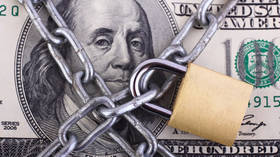US could use imperial Chinese debt to ‘simply default’ on Beijing’s $1 trillion of US bond holdings
Published time: 2 Sep, 2019 13:42Edited time: 2 Sep, 2019 14:51

Washington is exploring new ways to target Beijing as it runs out of goods to tax in the ongoing trade war, and century-old Chinese bonds could become a weapon, analysts have told RT.
On Sunday, the latest tit-for-tat tariffs came into force. The US slapped a wide range of Chinese goods with 15 percent tariffs, while Beijing responded with levies ranging from 5 to 10 percent on American imports, including agricultural products. Despite the tariffs going into effect, the sides are still planning to hold trade talks later this month.
If the two sides still fail to hammer out their differences, the second batch of levies is scheduled to go into effect starting December 15, and separate US tariff hikes come into force in October.
ALSO ON RT.COMBrace for higher prices: New round of US-China tariffs comes into force
But the trade war adversaries are already considering options beyond tariffs. Beijing, which enjoys a trade surplus with the US, has hinted it could use rare earth metals as a leverage. There is also China’s “nuclear” option of dumping US Treasuries.
Meanwhile, Washington has been reminded of China’s century-old bonds incurred before the nation adopted communism, which, adjusted for inflation, interest and other fees, amount to around $1 trillion, perfectly covering Beijing’s holdings of US Treasury Bills.
“The US will simply default on $1 trillion of UST bonds held by China and claim, based on these old bonds, that they are justified in doing so,” Max Keiser, the host of RT’s Keiser Report, said.
While it’s really doubtful that China would ever pay out, the US’ attempt to claim the money would only trigger serious economic problems and make the already turbulent situation worse, investment guru Jim Rogers told RT.
“If America gets a ruling that they [China] must pay then what America would do is freeze Chinese assets in America… take those assets or seize those assets. And then you have a very serious trade war going on,”Rogers said, adding that China would certainly retaliate to such a move.
The individual holders of the antique bonds can do little to get any money from China, which has never recognized the debt. Firstly, they would have to have their claim recognized, win the case, and then find some way to force China to cash out, according to Duke University professor Mitu Gulati.
However, it would be a completely different story if the Trump administration steps in. While the US government used to support China, when holders of the imperial bonds sued it (Jackson v People’s Republic of China), and the case was dismissed, the current White House administration may not be so supportive, according to the analyst.
“Trump might not act in the same way if a case were brought today, especially if the bondholders were his ardent supporters,” Gulati noted. “Now, if the US federal government were trying to help the creditors sue, that would be a different story. But I don’t think that even the Trump administration is that crazy.”

0 Comments:
Post a Comment
Subscribe to Post Comments [Atom]
<< Home